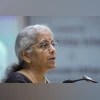)
Union Finance Minister Nirmala Sitharaman (Photo: PTI)
Scheduled commercial banks should avoid engaging in long-term, high-risk funding and instead concentrate on mobilizing deposits, retail lending, and supporting medium-term projects to prevent a recurrence of non-performing assets (NPA) crisis caused by asset-liability mismatches, Finance Minister Nirmala Sitharaman said on Tuesday. She emphasized that institutions like NaBFID (National Bank for Financing Infrastructure and Development) are better positioned to finance long-term projects than commercial banks.
“Banks should be the first source of mobilising deposits. They will have to gather deposits and lend. I am not saying that core businesses should get confined only to that. They can, of course, support projects in a very conscious way, medium term and not very long term”, Sitharaman said at an event in Mumbai. “…it cannot lead to once more that horrible situation that Indian banks were in where there was asset liability mismatch”, she added.
“And that is why it is not for them to go for high-risk, long-term funding, which is the business of NaBFID. It is their business for long-term funding, high-risk funding, not the scheduled commercial banks’,” she further said.
Gross non-performing assets (NPAs) and net NPAs ratios of scheduled commercial banks have fallen to a multi-year low of 2.8 per cent and 0.6 per cent, respectively, in March 2024, after reaching a peak of over 11 per cent in 2017-18.
“So you got into that (asset liability mismatch) situation and together with it to aggravate it was also this phone banking, where cronies were being given loans, which you (banks) couldn’t retrieve at all. So, banks will have to be conscious of what they do and how they do it, and essentially, those which are very much in the bank board’s hands are avoiding asset liability mismatches,” she emphasized.
Commenting on the important role Indian regulators have played in shaping the financial sector, Sitharaman said: “They (regulators) are doing a world-class job.”
“I think Indian regulators, and the way in which they are functioning, have actually brought greater transparency to the system and they are now being looked up to by even their peers outside,” she said.
Although she refrained from directly commenting on the ongoing issue with Sebi chairperson Madhabi Puri Buch, she emphasized that there is a lot to be looked into in terms of facts, which are coming out on the matter. “I strongly recommend that facts are taken on board before we discuss anything to do with the regulators,” she said.
Buch has found herself in the eye of the storm, with the Congress party and US-based short-seller Hindenburg Research questioning her objectivity in the Adani probe and allegations of conflict of interest while dealing with corporate files. Buch and her husband have rebutted all the allegations.
Meanwhile, Sitharaman is of the opinion that the CPI basket and the WPI basket don’t seem to have much of a commonness. “The WPI basket has certain items which probably should be in CPI. And, the CPI also has some items in the basket which probably don’t have a contemporary value as it was once,” she said, adding that there needs to be a thorough look at the components in the basket so that they are period relevant.
This year’s Economic Survey has suggested exploring whether India’s inflation-targeting framework should exclude food inflation, and the country’s Chief Economic Adviser V Anantha Nageswaran has highlighted that monetary policy is a short-run macro aggregate demand management tool, which cannot manage aggregate supply shock and food shocks are predominantly supply shocks. However, RBI Governor Shaktikanta Das has highlighted that with food inflation comprising 46 per cent of the consumption basket, the pressures from it cannot be ignored by the Monetary Policy Committee (MPC).
Commenting on the issue of freebies being given by various state governments, Sitharaman said, “I am not in favour of freebies, which cannot be sustained in your normal welfare kitty.”
“We don’t want freebies, but you cannot in that name deny the poor the help that they need to get for some more time until they come out of the pathetic state of poverty,” she said, adding that if (states) are able to extend some kind of help, it should be in alignment with their budgetary and fiscal situation.
Meanwhile, the finance minister also highlighted the work done by digital investment platforms. Post-pandemic Indian middle class have become risk-takers as they have turned towards the equity markets for investing their savings instead of parking their money in low-yielding deposits of banks, she said.
“Post-Covid, you have many Indians willing to take that risk and enter into the market rather than comfortably sit in low-interest-paying deposit accounts. I am not suggesting that this is better or that is better. It is up to the individual to take a call where s/he wants to put his/her money,” she said.
Interestingly, Sitharaman’s statements come at a time when Indian banks are struggling to mobilize deposits with the RBI repeatedly directing them to adopt innovative ways to attract deposits.
She also urged banks to participate in the PM internship programme that has been launched. “These are internships, they are not jobs. But by this internship, we honestly believe the youth of India will be able to get a picture of what is expected of them. And, therefore, I invite all of you to participate in this PM skill internship programme, which will give our youth the advantage,” she said.
Additionally, Sitharaman also urged banks to plan about cyber security risks. “We need to be staying ahead of the curve on it. Use futuristic technologies, whether it’s artificial intelligence (AI), big data, cloud computing, or machine learning,” she said.
First Published: Oct 08 2024 | 8:22 PM IST





